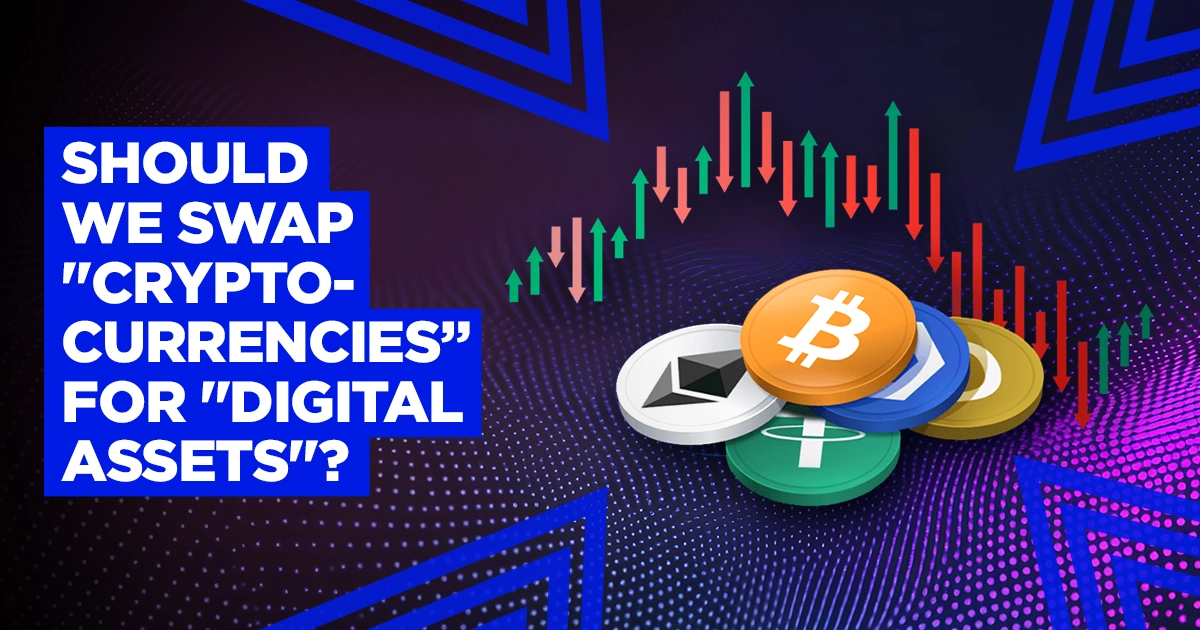![]()
By Mark Hunter
1 month agoTue Oct 22 2024 08:41:32

Reading Time: 2 minutes
- The term “cryptocurrencies” has been around since the birth of Bitcoin, but it has since created misconceptions about their purpose
- Digital assets have diversified beyond currency use, encompassing NFTs, stablecoins, and more
- The evolving regulatory landscape has prompted a shift towards broader, more accurate terminology
Ever since Satoshi Nakamoto and Martti Malmi agreed that the term “cryptocurrency” best described Bitcoin in 2009, the term has been used for all tokens produced in the sector. However, in recent years, the term “cryptocurrency” has created confusion and limited understanding of the technology. What started as a means of decentralized payments has expanded into a more complex ecosystem, including non-fungible tokens (NFTs), decentralized finance (DeFi), and digital ownership. Is it time, therefore, to ditch “cryptocurrencies” for “digital assets” for good?
What’s in a Name?
When Bitcoin was introduced in 2009, the term “cryptocurrency” seemed fitting, as the focus was on decentralized, peer-to-peer digital currency. However, the industry has since evolved far beyond this narrow definition. “Cryptocurrency” implies that these technologies are solely currencies, as Bitcoin was intended to be, which no longer captures the breadth of their applications.
We can’t even say that the majority of tokens have nothing to do with currencies; the fact is that the use of digital assets as a currency replacement has all but died out, with almost no new coins being created for that purpose. The only high-ranking coins focused on being a form of payment are those that have been around for years and are there almost by reputation rather than usage.
Digital Assets: A Change in Scope
The suggested shift from “cryptocurrencies” to “digital assets” is rooted in the need for more precise terminology that reflects the diverse functions of blockchain technology today. Timothy Massad, former chairman of the U.S. Commodity Futures Trading Commission (CFTC), has emphasized that the term “cryptocurrency” has become outdated. He points out that many digital assets function more like commodities or securities rather than traditional currencies, and this distinction is essential for regulatory clarity.
Massad’s views reflect the broader evolution of the crypto space, which now includes NFTs, decentralized finance (DeFi), and utility tokens, among other innovations. These applications extend beyond simple currency use, making the term “cryptocurrency” misleading. He advocates for a more comprehensive regulatory framework to address this diversity, urging that assets like Bitcoin, while commodities, need distinct rules to protect investors and ensure system security.
Financial Titans May Push Change
It also can’t be ignored that the word “cryptocurrencies” has become inextricably linked in the public and the media with crime. The idea of a currency being hidden or in some way secret so as to facilitate nefarious activities has been bred over the last decade, almost necessitating a move to “digital assets”, which has a much more respectable and investable ring to it.
This is much more fitting with the likes of Bitcoin and Ethereum which have their own ETFs . the term “digital assets” is catching on, and we may see a concerted effort to shift to this narrative by the financial giants running these, and further, ETFs as they look to entice those with deeper pockets while erasing the troubles of the past decade.




